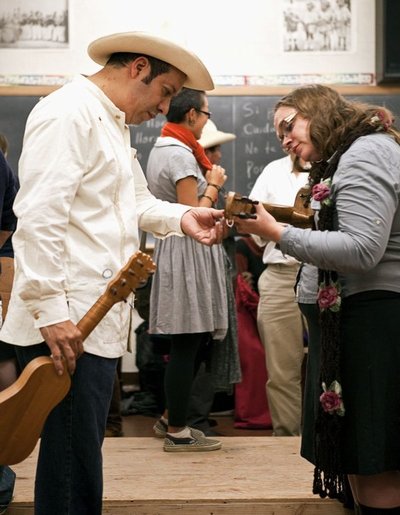November 5, 2009
Making Music: UW seminar works to build community through the arts
Often art is considered elitist or unattainable, but UW students are working to help debunk this belief and show that art can be used as a tool to build community.
Seattle Fandango Project: Community Activism through Art, a UW seminar, is part of the University’s involvement in the larger Seattle Fandango Project and is a one-credit class. It meets three times throughout the quarter and enrolled students are required to attend four workshops and other Fandango-related events.
In the seminar, students learn about the history of Fandango movement, social justice projects and read theoretical considerations of music and social relations.
Ethnomusicology Professor Shannon Dudley, one of the seminar instructors, explained, “The project is inspired by the Fandango celebration of Veracruz, Mexico. It uses music, singing, and dancing to bring people together and to create a spirit of convivencia or living together in the community.
“Since the ‘70s,” Dudley said, “young people in Veracruz have been working to reclaim music and art as a way to build community. In the ‘90s, Chicano musicians and artists from Los Angeles organized with Veracruz communities and brought the Fandango to the United States. It is very much a grassroots movement and is the model for what we are working on here in Seattle.”
At a Fandango, men and women step onto a wooden platform known as a “tarima” and dance away. The night is full of music and singing and there is no audience because everyone participates — which is the point of a Fandango.
The first Fandango in Seattle was Friday, Oct. 30, at the Seattle Center.
Husband and wife team Quetzal Flores and Martha Gonzalez helped bring the project to Seattle. Flores is the project coordinator through the American Music Partnership of Seattle and Gonzalez, a women studies doctoral student, is enrolled in the seminar.
“My husband and I are part of a larger informal transnational coalition of artists and musicians from California and Mexico called Fandango sin Fronteras (Fandango without Borders),” said Gonzalez, “that has given birth to the Seattle Fandango Project.”
Gonzalez, a dancer, singer and player of the jarana (a small eight string instrument), finds the project rewarding.
“I’ve been able to witness the way the community has embraced the conviviality of Fandango. The participatory transgenerational aspects of this music have slowly created a spirit that is empowering to many,” she said.
The seminar is only part of the UW’s involvement. The University is one of three sites chosen to host Fandango workshops for the community. The other two locations are the Youngstown Cultural Arts Center in West Seattle and El Centro De La Raza in Beacon Hill.
The workshops teach community members of all skill levels Fandango singing, dancing and music.
Dudley said that around Seattle, the UW effort has the most diverse participants — spanning many age groups.
Gonzalez loves that about the project.
“In any one of the workshops,” Gonzalez said, “you can bet that you’ll find men, women and children of all ages and of all skill levels interacting by creating music together. You don’t really see that often anymore — especially in U.S. culture. Experiencing these moments makes you realize that the goals of the project are important, relevant, and a necessary aspect of being human.”
Student Caroline Lanza discovered the seminar while looking through the UW Simpson Center course offerings. A doctoral student in social welfare, Lanza said, “Participatory music and dance has always been a big part of my personal life. It helps to shed light on many healing processes for me as a social worker and health researcher. It’s great to share this with others.
“The seminar workshops are also fun,” she added, “and I love any kind of community-campus collaboration. It is a thrill to see how inspired community members, faculty and students alike are by their experiences of participating in the project.”
Francisco Orozco, another seminar participant and ethnomusicology doctoral student, met Flores and Gonzalez when he lived in Oakland, Calif. Also while in Oakland he had the opportunity to study with Veracruz musicians.
Later when Flores, Gonzalez and he were all in Seattle, they began to meet up and play music. It was about that time that Flores started throwing ideas around for the project, said Orozco. So, the ethnomusicology student is no stranger to the idea of the Fandango.
Orozco describes the project as a way to build community within and outside of Seattle’s Latino community.
“I see it as a platform for Latinos and non-Latinos to come together,” said Orozco, “and to share our diverse experiences.”
Dudley expressed the same ultimate goal that the project would help connect people beyond those of Mexican heritage.
“The Fandango has worked before and will hopefully work here because music and art inspire people to come together and work together,” he said. “The project uses art to build a foundation for community organizing and social justice work.
“The seminar is important because it is opening the eyes of graduate students to the idea that music and dancing can be more than simply an art. They can be used as a method to build community.”
The seminar meets for a final time Nov. 6 to discuss the Fandango and to encourage students to start thinking about what they can do now to continue with the project.



